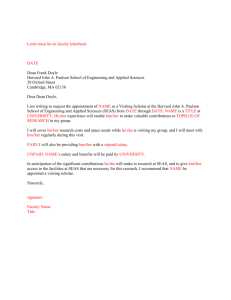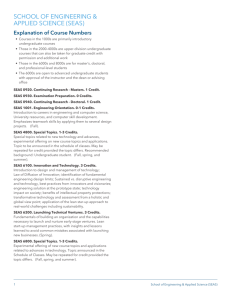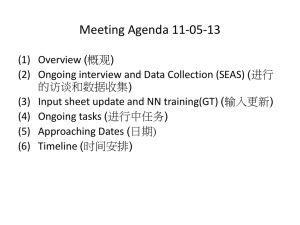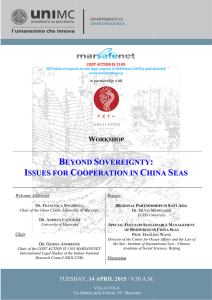SEAS New Course Proposal Form
advertisement
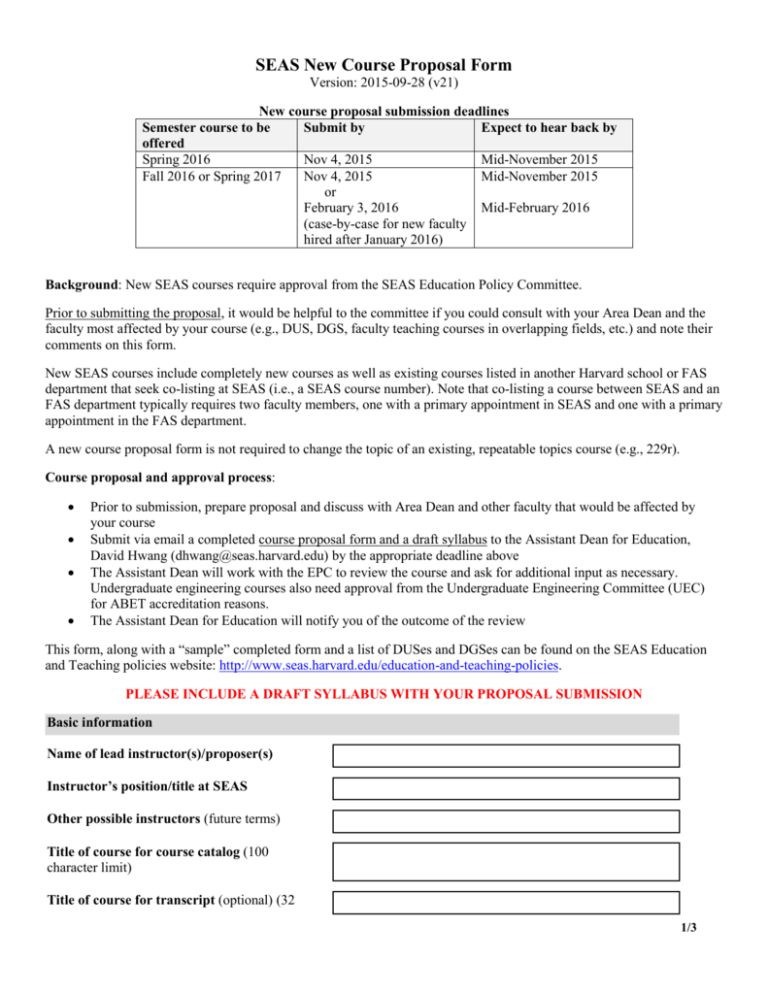
SEAS New Course Proposal Form Version: 2015-09-28 (v21) New course proposal submission deadlines Semester course to be Submit by Expect to hear back by offered Spring 2016 Nov 4, 2015 Mid-November 2015 Fall 2016 or Spring 2017 Nov 4, 2015 Mid-November 2015 or February 3, 2016 Mid-February 2016 (case-by-case for new faculty hired after January 2016) Background: New SEAS courses require approval from the SEAS Education Policy Committee. Prior to submitting the proposal, it would be helpful to the committee if you could consult with your Area Dean and the faculty most affected by your course (e.g., DUS, DGS, faculty teaching courses in overlapping fields, etc.) and note their comments on this form. New SEAS courses include completely new courses as well as existing courses listed in another Harvard school or FAS department that seek co-listing at SEAS (i.e., a SEAS course number). Note that co-listing a course between SEAS and an FAS department typically requires two faculty members, one with a primary appointment in SEAS and one with a primary appointment in the FAS department. A new course proposal form is not required to change the topic of an existing, repeatable topics course (e.g., 229r). Course proposal and approval process: Prior to submission, prepare proposal and discuss with Area Dean and other faculty that would be affected by your course Submit via email a completed course proposal form and a draft syllabus to the Assistant Dean for Education, David Hwang (dhwang@seas.harvard.edu) by the appropriate deadline above The Assistant Dean will work with the EPC to review the course and ask for additional input as necessary. Undergraduate engineering courses also need approval from the Undergraduate Engineering Committee (UEC) for ABET accreditation reasons. The Assistant Dean for Education will notify you of the outcome of the review This form, along with a “sample” completed form and a list of DUSes and DGSes can be found on the SEAS Education and Teaching policies website: http://www.seas.harvard.edu/education-and-teaching-policies. PLEASE INCLUDE A DRAFT SYLLABUS WITH YOUR PROPOSAL SUBMISSION Basic information Name of lead instructor(s)/proposer(s) Instructor’s position/title at SEAS Other possible instructors (future terms) Title of course for course catalog (100 character limit) Title of course for transcript (optional) (32 1/3 character limit) Course description for course catalog (~100 word limit) Prerequisites First term to be offered (i.e., Spring 201X) Course meeting length (i.e., 1.5 hour classes twice per week) Requested times/days (optional) (i.e., Tue and Thu, 2:30 pm – 4 pm) Offering type (offered one-time only, offered once as a pilot course and re-evaluated, or offered as a permanent course)? Offering frequency (if a permanent course, how often will it be offered: each term, each year, every two years, etc.?) Graduate or undergraduate course? If graduate, will it be open to undergrads? Proposed course number (optional) Range of expected enrollment Do you anticipate an enrollment limit? What is the limit and how will you choose students? How will this course affect the lead instructor’s teaching responsibilities (i.e., what course will no longer be taught)? Will this course require support from the SEAS Active Learning Labs? If so, have you discussed it with Anas Chalah, Exec Director of the labs (achalah@seas.harvard.edu)? Curriculum and pedagogy Describe the course rationale (e.g., new field, student demand, etc.) and curriculum fit/need Is this course replacing a current course or is it a new topic? Are there other courses at SEAS or FAS similar in content? If so, why is 2/3 this course different? Teaching format (e.g., lecture, flipped, lab only, etc.) List of expected learning outcomes for students when they complete the course (this field is required) How will you assess/grade students in your course (i.e., homeworks, labs, exams, etc.)? Who is the intended audience (i.e. freshmen, concentrators, G1 Ph.D. students, etc.)? Do you expect this to count for undergraduate concentration credit? If yes, which concentration: Applied Math, Computer Science, Engineering? For grad courses: do you expect this to count as a standard technical course for PhD credit? Note: 294r, 297r, and 298r courses typically do not count as standard technical courses. Financial resources Will this course require extra financial resources beyond regular TF allocations (e.g. lab materials, software, equipment, trips, etc.)? Explain estimated budget needs. Other special requests/items Other unique requests (e.g. co-listing course with another school/department, IP issues)? Any specific classroom requirement (e.g. specific teaching lab room, Pierce 301, etc.)? Discussions with other SEAS faculty Have you discussed this course with your Area Dean (or Exec Dean for Education and Research, for non-ladder faculty)? Please list the Area Dean and any comments. Which other SEAS ladder faculty (if any) have you discussed the course with? Please comment. 3/3
